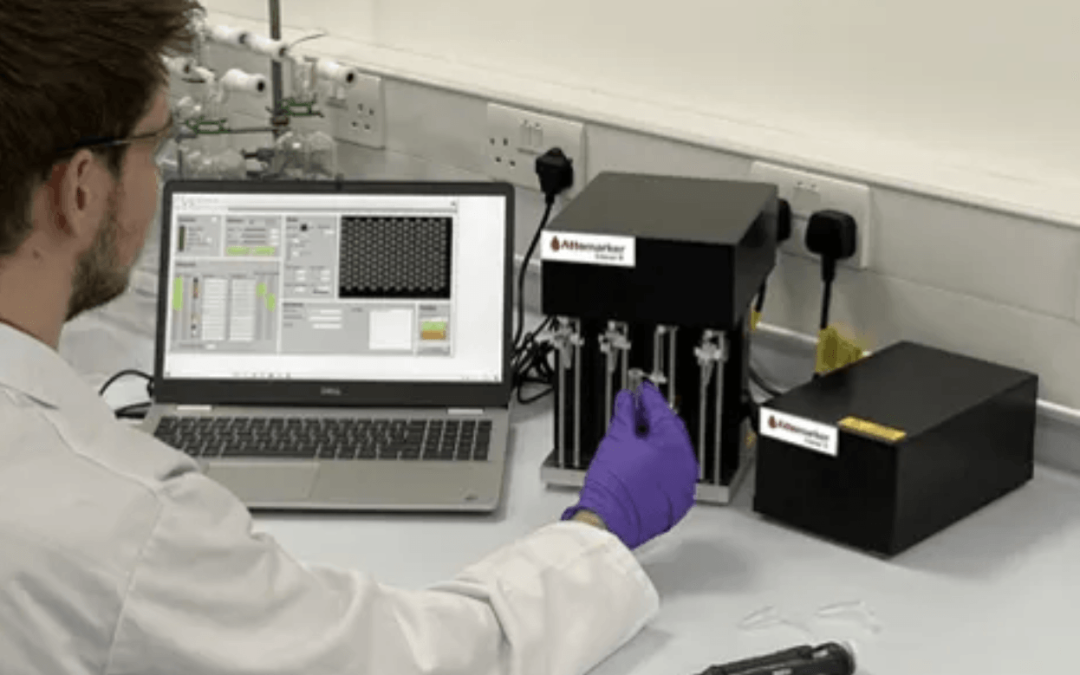- The Medicines and Healthcare products Regulatory Agency (MHRA) has approved Attomarker’s next-generation Triple Antibody Test for use in the UK
- The Attomarker test detects antibodies to three different COVID-19 proteins in seven minutes at the point of care, giving a more powerful profile of the clinically relevant biomarkers than other currently available COVID-19 tests
- The next generation test detected antibodies in a real cohort of recovering patients at St. Thomas’ Hospital with sensitivity of 96%, 14 days after the onset of symptoms
- Attomarker is currently trialling a combined COVID-19/flu antibody test with this year’s flu vaccine
Attomarker’s new COVID-19 Triple Antibody Test could well represent the next-generation of rapid and accurate COVID-19 antibody testing.
The test device has been approved by the MHRA following positive results from an initial patient study at St. Thomas’ Hospital. It delivers laboratory level, quantitative results in seven minutes at the point of care. Attomarker’s technology is now being further developed into a miniaturised hand-held device, docked to a smartphone, to provide the same quantitative accuracy in the community at point-of-care, including care homes, and pharmacies.
A number of currently available antibody tests only measure antibodies for one nucleocapsid protein (N) of the SARS-CoV-2 virus. Attomarker technology uses a multiplex platform, which means that it tests for multiple clinically relevant biomarkers against the SARS-CoV-2 virus simultaneously: Attomarker tests for three virus proteins (Spike 1, Spike 2 & N) and three classes of antibodies (IgM, IgG and IgA), giving a more powerful profile of the patient’s immune response to COVID-19. This could help validate a COVID-19 vaccine when a viable candidate completes development.
Further testing of the multiplex technology has begun at the Royal Devon and Exeter NHS Foundation Trust, trialling a combined COVID-19/flu antibody test in order to help healthcare professionals discriminate between the two infections. The test could ease the burden on the NHS ahead of this year’s flu season.
The results from the pilot study conducted at St. Thomas’ Hospital, published this week in the journal of the Royal Society of Chemistry, Analyst, comprised 119 tests over a five-day period and investigated the performance of the antibody test on 74 admitted patients from an early stage of the COVID-19 outbreak (between 21/02/20 and 30/03/20).[1] Further analysis with an additional 200 patients, included in a second paper awaiting publication, shows that Attomarker’s Triple Antibody test delivers a sensitivity of up to 96% in detecting COVID-19 antibodies, including in patients who have previously presented negative swab tests. This is a significant improvement compared to sensitivity detection with many current antibody tests, requiring laboratory testing, which range between 83.9% – 93.9% in sensitivity. [2,3]
The trial was fully funded by the University of Exeter’s COVID-19 Emergency Appeal which raised a record £120,000 from over 1,000 alumni.
To deliver the technology to the frontline, Smiths Detection, part of Smiths Group, is working with Attomarker and has manufactured 10 pre-production devices, with the ability to ramp up volume according to demand. Together with Scienion, the array manufacturer, this gives Attomarker the capacity to provide a testing service in volume early Autumn, each device being able to test up to 50 blood samples per day. The future production of a miniaturised version will enable the technology to be delivered at home, and to low-income countries.
Professor Neil Gow, FRS, DVC Research at the University of Exeter, said “It’s exciting to see the painstaking development of this technology by the Attomarker team led by Andrew Shaw delivering a vital tool to address the health challenges of Covid-19. The collaboration with colleagues at St. Thomas’ Hospital has fully validated the considerable potential of this novel diagnostic platform in simultaneously detecting three separate anti-Covid antibodies.
“Professor Sir Robert Lechler, Senior Vice President/Provost (Health) Kings College London, said: “This technology tests for antibodies against three viral proteins, two spikes and the nucleocapsid, as well as three classes of antibody, showing quantitative results. These differentiators will be key to beginning the next phase of COVID-19 testing urgently needed in the UK, equipping healthcare professionals initially with the data they need to better manage the epidemic.”
Professor Andrew Shaw, CEO & Founder of Attomarker and Associate Professor of Physical Chemistry at the University of Exeter, said: “This is the next generation of antibody tests, giving rapid laboratory level results on three classes of antibody in seven minutes and all at point of care. It is another success story for British universities and British science in the global battle against COVID-19.”
Regarding the combined COVID-19/flu test, Andrew commented: “We are proud to have worked alongside St Thomas’ Hospital and now to be working with Royal Devon and Exeter to test our technology including the combination COVID-19/flu test ahead of the winter season, and we look forward to sharing results from this crucial study in due course.”
Peter Ellingworth, Chief Executive of The Association of British Health Tech Industries (ABHI) said: “The UK is home to top-class universities, cutting edge businesses and a thriving HealthTech industry serving patients at home and abroad. A company like Attomarker embodies each of these elements, and their work in the fight against COVID-19 is to be commended. If ever there was a time for the UK to invest in diagnostics, it is now, so that we can harness these exciting innovations and build an industry that is fit for the future.”
Download The Next Generation Triple Antibody Test
[1] A. Shaw et al. Analyst. Real-world evaluation of a novel technology for quantitative simultaneous antibody detection against multiple SARS-CoV-2 antigens in a cohort of patients presenting withCOVID-19 syndrome (July 2020). Available at: https://pubs.rsc.org/en/Content/ArticleLanding/2020/AN/D0AN01066A#!divAbstract [Last accessed: July 2020]
[2] Public Health England. Evaluation of Roche Elecsys AntiSARS-CoV-2 serology assay for the detection of anti-SARS-CoV-2 antibodies (May 2020). Available at: https://assets.publishing.service.gov.uk/government/uploads/system/uploads/attachment_data/file/891598/Evaluation_of_Roche_Elecsys_anti_SARS_CoV_2_PHE_200610_v8.1_FINAL.pdf [Last accessed: July 2020]
[3] Public Health England. Evaluation of the Abbott SARS-CoV-2 IgG for the detection of anti-SARSCoV-2 antibodies (May 2020). Available at: https://assets.publishing.service.gov.uk/government/uploads/system/uploads/attachment_data/file/890566/Evaluation_of_Abbott_SARS_CoV_2_IgG_PHE.pdf [Last accessed: July 2020]
